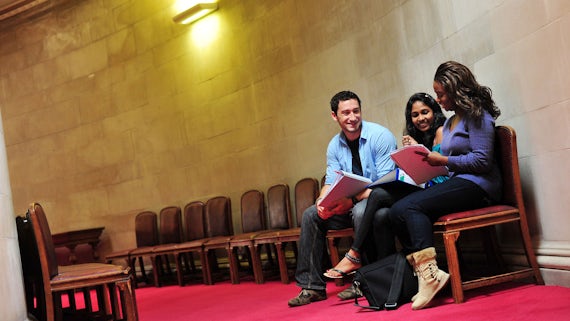Study aims to reduce risk of Covid-19 to people experiencing homelessness
8 September 2020

People experiencing homelessness and offered accommodation since Covid-19 will be interviewed as part of research assessing the support they have received.
The study, the first of its kind in the UK, is led by academics at Cardiff University and the Centre for Homelessness Impact. It will robustly assess which housing options are most likely to provide positive outcomes. This innovative partnership has been awarded funding from the Economic and Social Research Council which is part of UK Research and Innovation (UKRI).
At the beginning of the Covid-19 lockdown, many people experiencing street homelessness were offered emergency accommodation to facilitate safe self-isolation. As local authorities now begin to make more suitable housing arrangements for those currently living in hotels and other emergency accommodation, this study will provide valuable insights into tackling homelessness and reducing Covid-19.
Participating local authorities in England will support the research team to follow individuals over a period of 12 months to evaluate how they are doing, looking at housing stability, health and wellbeing.
The aim is to reduce the rate of Covid-19 infection as well as the risk of returning to homelessness.
Dr Peter Mackie, the study’s Principal Investigator, based at Cardiff University’s School of Geography and Planning, said: “The Covid-19 pandemic has resulted in radical changes in policy and practice responses to homelessness. For the first time homelessness has been treated as a crisis.

This collaborative study, which seeks the views of homeless people, will provide new insights into the effectiveness of local authority responses and will help to inform future policy and practice for the benefit of those affected by homelessness.
Dr Ligia Teixeira, CEO of the Centre for Homelessness Impact said: “As we stand on the precipice of a world fundamentally changed by coronavirus, we must take this opportunity to use evidence to improve outcomes for those most affected. It is our hope that in conducting this trial, we can give local authorities that are operating with limited resources, the tools they need to ensure that people are not returning to the streets.”
The study will include three main elements:
- An impact evaluation, to understand which types of accommodation have better outcomes;
- A process and implementation component, to understand barriers and facilitators and differences in how different accommodation models are used in different local authority areas; and,
- A cost component, to understand which types of accommodation provide the best value for money.
The study, titled Moving On, has been awarded £660,000 funding from UKRI as part of their funding programme for short-term projects addressing and mitigating the health, social, economic, cultural and environmental impacts of the Covid-19 outbreak. It is being delivered as a collaboration between the Centre for Homelessness Impact, Cardiff University, Alma Economics, and a group of six partner local authorities.
The project is expected to run for 18 months. It counts the Ministry of Housing, Communities, and Local Government (MHCLG), Bloomberg associates and Comic Relief among its supporters. The project will benefit from the expert advice of Tim Aubrey and Dennis Culhane who are leading academics in homelessness interventions from the University of Ottawa and the University of Pennsylvania, respectively.
Dr Rebecca Cannings-John, the lead for the impact evaluation from Cardiff University’s Centre for Trials Research, added: “Moving On is the first trial to be conducted in the UK with people experiencing homelessness and we are delighted to work with the School of Geography and Planning and the Centre for Homelessness Impact to enable it to happen.

This is an important study that will add to the research base, to help inform which housing options could provide the best outcomes for people experiencing homelessness.
Founded in 2018, the Centre for Homelessness Impact is an independent organisation that supports the use of data and evidence in bringing about a sustainable end to homelessness.




